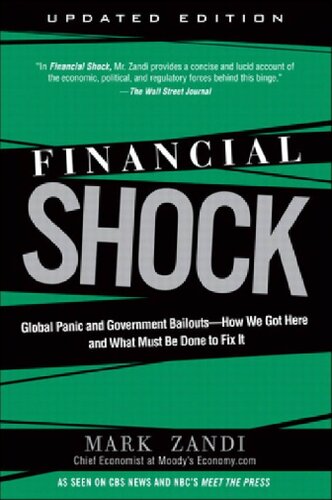

Most ebook files are in PDF format, so you can easily read them using various software such as Foxit Reader or directly on the Google Chrome browser.
Some ebook files are released by publishers in other formats such as .awz, .mobi, .epub, .fb2, etc. You may need to install specific software to read these formats on mobile/PC, such as Calibre.
Please read the tutorial at this link: https://ebookbell.com/faq
We offer FREE conversion to the popular formats you request; however, this may take some time. Therefore, right after payment, please email us, and we will try to provide the service as quickly as possible.
For some exceptional file formats or broken links (if any), please refrain from opening any disputes. Instead, email us first, and we will try to assist within a maximum of 6 hours.
EbookBell Team

0.0
0 reviews–The Wall Street Journal
“The obvious place to start is the financial crisis, and the clearest guide to it that I’ve read is Financial Shock by Mark Zandi....It is an impressively lucid guide to the big issues.”
– David Leonhardt, The New York Times
“If you wonder how it could be possible for a subprime mortgage loan to bring the global financial system and the U.S. economy to its knees, you should read this book. No one is better qualified to provide this insight and advice than Mark Zandi.”
– Larry Kudlow, Host, CNBC’s Kudlow & Company
“Mark Zandi provides insightful analysis, thoughtful recommendations, and a comprehensible explanation of the financial crisis that is accessible to the general public and extremely useful to those who specialize in the area.”
– Barney Frank, Chairman, House Financial Services Committee
The Definitive Financial Meltdown Exposé:
Now completely updated to include discussions of the Obama administration’s many policy initiatives and proposed solutions.
•Includes expanded coverage of the market meltdown, the bailout bill and stimulus plans, the bank rescue plan, and the foreclosure mitigation plan
• Sifting the wreckage, fixing the blame: the roles of mortgage lenders, investment bankers, speculators, the real estate industry, regulators, the Fed, and homebuyers
• Tomorrow’s emerging financial shocks―and how to prevent them